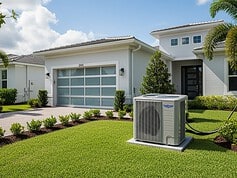Key Takeaways
- Heat pumps provide year-round heating and cooling, improving home comfort and efficiency.
- Modern advancements and financial incentives make heat pumps a practical investment for most homeowners.
- Energy-efficient technology can lead to notable savings and reduced carbon emissions.
- Choosing, sizing, and maintaining a heat pump system directly affect performance and reliability.
- Public awareness and policy trends fuel the growth of heat pumps in communities nationwide.
Why Choose Heat Pumps?
The way homeowners approach comfort is rapidly changing, and heat pumps are taking center stage in this transformation. Unlike conventional systems specializing in heating or cooling, heat pumps efficiently do both by moving heat between the indoors and outdoors to maintain an ideal indoor environment, regardless of season. This versatility makes them especially appealing for people aiming to simplify their home’s infrastructure. For example, a family dealing with scorching summers and chilly winters can now rely on one streamlined system for consistent comfort all year. As interest grows across the country in affordable, eco-friendly upgrades, more individuals are exploring Los Angeles home heat pump installation to showcase how accessible and effective these solutions have become for many homes. With growing support from energy efficiency programs and utility rebates, homeowners have even more reason to switch. The transition to heat pumps reflects a broader shift toward smarter, cleaner living in urban and suburban settings.
With an upsurge in demand, expert organizations and independent energy consultants are advocating heat pumps as the go-to technology for sustainable home improvements. Because these systems work effectively in most American climates—from coastal cities to mountain towns—they are increasingly seen as the sensible next step for new builds, renovations, or replacements of outdated HVAC setups. Considering a heat pump is a wise move, whether you’re an eco-minded homeowner or want to future-proof your investment.
Energy Savings and Financial Advantages
Switching to a heat pump offers a significant financial advantage over traditional electric resistance heating systems. According to the U.S. Department of Energy, heat pumps can cut electricity use for heating by 50% compared to older options. This reduces monthly utility bills and continues throughout the system’s lifespan. Many regions now offer local rebates and federal tax incentives to encourage this transition, making the upfront costs lower than ever. Also, homes with efficient heat pumps may see increased resale value as more buyers prioritize modern systems. These benefits make heat pump adoption a compelling choice for families with strict budgets or those aiming to reduce monthly expenses.
Improved Home Comfort and Air Quality
Heat pumps significantly improve living conditions by providing a gentle, consistent airflow that maintains room temperature. This eliminates the frustration of chilly basements or sweltering attic rooms, making each part of the home comfortable. Heat pumps also have built-in filtration to target dust, pollen, pet dander, and other irritants before they reach the lungs, benefiting those with allergies or asthma. Additionally, these systems operate more quietly than traditional HVAC units, reducing background noise and creating a more peaceful home environment year-round. This makes them a valuable addition to any home management system.
Environmental Benefits You Can Feel
Heat pumps are a significant investment in a cleaner, healthier planet. They are powered by electricity and can be easily combined with renewable energy sources, reducing your home’s carbon footprint each season. Local and state governments promote greener energy, encouraging homeowners to adopt this efficient solution. This triple-win approach offers comfort, cost, and conscience, making heat pumps a crucial part of future neighborhoods.
New Technologies and Incentives
Heat pump technology has seen rapid innovation, with models now performing well even in sub-freezing temperatures. Options include advanced defrost cycles, smart thermostats, variable-speed compressors, and compatibility with smart home platforms. These features allow users to schedule, monitor, and adjust performance using smartphones or voice commands. Increased incentives, such as federal, state, and local programs, are making these upgrades more accessible, reducing installation costs and making the switch easier and more rewarding. This makes the upgrade more accessible for homeowners.
Finding the Right System for Your Home
The choice of the best heat pump depends on factors such as your home’s size, age, insulation, and design. Oversized pumps can waste energy, and undersized ones may not provide comfort. A professional energy audit is recommended to find the best balance between investment and future cost savings. Installers use tools and technical guidelines to calculate needs accurately, and asking for projected energy savings or third-party efficiency ratings can clarify the long-term return on investment. You can ensure optimal performance, quiet operation, and consistent comfort for years by selecting the right size and style.
Simple Maintenance for Long Life
Heat pumps require minimal maintenance to maintain their functionality for over a decade. Essential routines include changing the air filter every three months, keeping the outdoor unit clean of debris, and scheduling yearly inspections with a licensed technician. These manageable tasks prevent system breakdowns during heat waves or cold snaps, ensuring comfort and peace of mind. Additionally, well-maintained systems maintain higher energy efficiency and prolong equipment lifespan, delivering the highest value for your investment.
Heat Pumps in the News
Heat pumps are gaining prominence in mainstream media and policy discussions as communities increasingly adopt them for reliable, clean, and affordable home heating and cooling. News coverage indicates that more municipalities are planning incentives, workshops, and direct funding to support these upgrades, indicating a likely surge in demand. As people learn about cost and climate advantages, interest and adoption rates rise. Heat pumps, once considered a niche product, are set to play an essential role in modern, resilient neighborhoods, making them a worthwhile consideration for homeowners.






